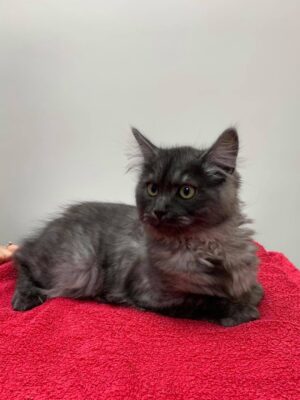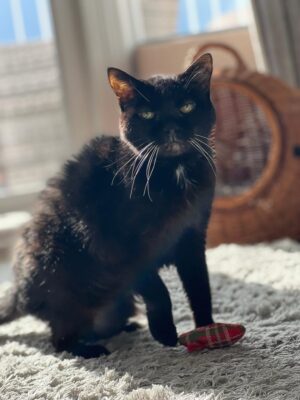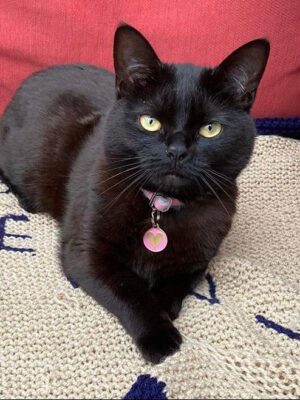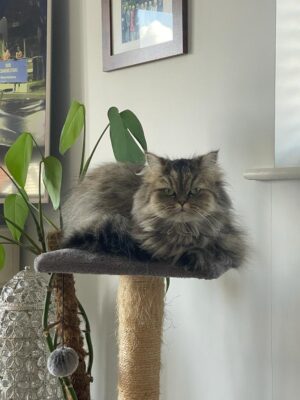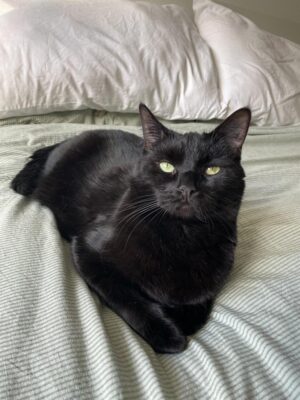Managing Arthritis
There are several things we can do to help our arthritic pet be more comfortable and confident in their day to day life. Around the home you could;
- Find an orthopaedic cat bed, or a small memory foam mattress you can put wherever the cat likes to usually sleep
- Cover slippy floors, steps and walkways with rugs or mats
- Minimise the need for stairs
- Use ramps or stairs for getting onto and off beds, sofas and window seats
- Ensure food and water is easily accessible without having to go too far
- Keep their environment warm, cold days can make your pet feel even more stiff! (Much like humans with arthritis!)
- Provide a litter tray with one low side so they don’t have to step or jump in and out
Grooming
Cats not grooming is a key indication that they may have arthritis. The reason that they do not groom is either that they are unable to reach certain parts of their body which they once were able to or they are unable to get themselves into a position to groom properly.
It is quite common for older cats to become matter around the lower back, chest and underside.
Making sure a good coat is maintained allows them feel more comfortable too, so you may have to help give them a helping hand by brushing them in their later years! If your cat won’t allow for you to do this, there are feline groomers that will be able to help, and we also offer a de-matting service here at Mulberry.
Weight Management
Managing your pets weight is essential if diagnosed with arthritis, overweight pets find it more difficult to move around as this puts extra strain through their joints.
Arthritic pets will be doing less exercise so it is important that their diet is modified in relation to this. The amount of food and treats given may have to be reduced
Our nurses can guide you and your pet towards healthy weight loss with some tips to aid the process
Diet and Nutrition
There are many types of food on the market to support joint health and mobility such as Royal Canin Mobility, Purina Joint Mobility and Hills J/D. These foods are rich in supplements that support your older pet.
Alternatively, you can add supplements to their normal food. These supplements are high in glucosamine and omega oils to support joint health. Some are capsules which you can sprinkle on their food and some are oral liquids; Nutraquin, Seraquin, Yumove Advance and Stride Plus.
Currently, there is limited scientific evidence on the efficacy of these supplements, but in human medicine it has been reported that they are beneficial, so there is no harm giving them to your four legged friend. Ideally, they should be given for at least 4-6 weeks before evaluating whether they may be making an impact on your pet’s joint health, however even then, the signs may not be that obvious to us.
Exercise
Once your pet’s pain management is under control, it is actually beneficial for your cat to keep moving (within reason!). This helps to strengthen the muscles around the joints and can improve their mobility over time too.
If you notice your cat laying around a lot, try to encourage them to start moving. It is great for them to do some gentle exercise but try to avoid them jumping, leaping or running!
Extra tips:
- Toy stimulation – playing with a feather gently encourages them to move
- Feeding toys – these help to stimulate the mind and body so will help get your cat moving
Avoid hazards around the home that could cause them to trip over or fall from.
Anti-inflammatory Medications
There are various anti-inflammatory medications available that are incredibly useful for managing discomfort. Most are given on a daily basis and need to be given regularly to ensure their efficacy.
It is possible that these types of medication can affect liver and kidney function, therefore before starting these, your vet may want to take a blood sample to check the liver and kidney values to ensure they are working optimally first. These should be repeated every 6-12 months.
Solensia
Solensia is an innovative new therapy called a Monoclonal Antibody, administered by injections subcutaneously into the back of the neck monthly. It is a biological therapy that works like your cat’s own immune system. It targets and neutralises a protein that stimulates pain in patients with arthritis. Through this action, one Solensia injection alleviates pain for a full month in addition to the benefit of having a positive safety profile.
Other ways of managing pain
There are other medications available to help manage pain related to arthritis. Often, a multimodal approach to medicine is the most effective way to control discomfort.
Please contact us if you think this may be needed and we will be able to help!
Complementary Therapies
There are many options available within this field which include;
- Laser
- Acupuncture
- Hydrotherapy
- Physiotherapy – including massage, prescribed exercises, shockwave therapy and cryotherapy
- Chiropractic
If you would like to explore these therapies, we recommend that you speak with a vet first who could then appropriately refer you to a therapist.
If you would like more information, you can visit PetMD’s website here.




